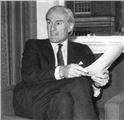Where The Profit Isn’t So Sweet
4 February 1972
DAILY MIRROR
Where The Profit Isn’t So Sweet
By Robert Head
Mighty British Leyland, our biggest exporter, is less profitable than most of the tiny sweetshops around the corner. The 193,000 workers who are paid an average of £32 a week to make Jaguar, Rover, Triumph, Austin and Morris cars and Leyland trucks and buses are told this by their bosses today.
The company last year sold £1,177,000,000 worth of vehicles at home and abroad for a profit of £32,400,000 before tax. “This means that profit margin after tax is only just over one and a half per cent, which is not enough even for the sweetshop around the corner,” says British Leyland’s finance director, Mr John Barber, in a report to his workers.
That is a lot better than in 1970, when profits dropped to £3,900,000, which meant a pathetic return after tax of only one quarter of one per cent on sales – equivalent to £2.25 on a £1000 car.
No self respecting sweet shop owner would sell his bubblegum, chocolate or toffee unless he was making at least ten per cent. One told me last night: “Any sweet sop making only one and a half per cent would go bust overnight.”
But British Leyland is far from going bust. These low profit margins are, however, the stark reasons behind the company’s call on its 220,000 shareholders to put up an extra £51 million in capital. The new cash is needed to expand production to pay for new models to beat off foreign car makers whose sales have been soaring in Britain.
Lord Stokes was his usual optimistic self about the future yesterday. “Barring very serious strikes and a prolonged coal strike, I am hoping for an increase in both sales and profits this year,” he told me.
“But there is a hell of a lot still to be done.”
He added: “The measures we have introduced throughout the business are now beginning to bear fruit.” On the stock market, British Leyland shares last night closed at 48.5p – down 1p on news of the new cash call.
More news from the archive
Compare classic car insurance quotes and buy online. A friendly service offering access to a range of policies and benefits.





